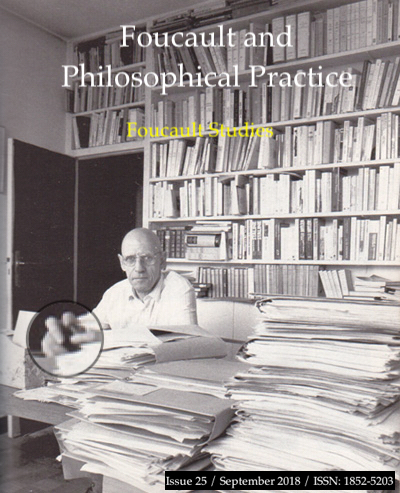The Third Modulation: Foucault, Security and Population
DOI:
https://doi.org/10.22439/fs.v0i25.5582Keywords:
security, discipline, foucault, population politics, demography, population controlAbstract
Evolving as Foucault’s third modulation of power, security power marks a radical departure from previous eras of sovereign and disciplinary power. Dramatically decentering the individual, altering the means by which government acts and shifting from a static to a dynamic conception of temporal activity, an understanding of Foucauldian security power provides a number of critical insights into modern governance. This paper seeks to explain and analyze Foucault’s conceptualization of security power as the new language of governance and apply it in relation to the pervasive phenomena of government attempts to control fertility. Using the cases of inter-war France and post-colonial India, the theorization of security power will be grounded in the realities of natalist policy demonstrating the universality of the exercise of security power and its applicability to numerous contexts and settings. The concretization of theory in case study not only illuminates the workings of a new model of power but highlights the difficulty of resisting this novel type of government control. Understanding power to understand modes of resistance is central to the Foucauldian method, and drawing from Foucault’s newly translated lectures, this paper will bring to light a fascinating mode of analysis which helps illuminate the evolving nature of power and control in the modern era.References
Aspalter, Christian. 2002. “Population Policy in India”, International Journal of Sociology and Social Policy 22:11/12 (2002), 48-71 https://doi.org/10.1108/01443330210790193
Barret, Deborah. and Tsui, Amy Ong. “Policy as Symbolic Statement: International Response to National Natalist Policies” Social Forces 78:1 (1999), 213-234 https://doi.org/10.1093/sf/78.1.213
Bose, Ashish, India’s Quest for Population Stabilisation New Delhi: National Book Trust, 2010.
Caldwell, John and Caldwell, Pat, Limiting Population Growth and the Ford Foundation Contribution London: Frances Pinter, 1986.
Chaubey, P.K., Population Policy for India: Perspectives, Issues and Challenges New Delhi: Kanishka Publishers, 1986.
Coale, Ansley J., and Hoover. Edgar Malone, Population Growth and Economic Development in Low-income Countries: A Case Study of India's Prospects Princeton: Princeton University Press, 1958.
Connelly, Matthew, “Seeing Beyond the State: The Population Control Movement and the Problem of Sovereignty”, Past and Present 193 (2006), 197-233 https://doi.org/10.1093/pastj/gtl016
Connelly, Matthew, Fatal Misconceptions London: Harvard University Press, 2008.
Demeny, Paul. 2003. “Population Policy: A Concise Summary” Population Council, Policy Research Division, Working Paper No. 173
Foucault, Michel, Discipline and Punish: The Birth of the Prison. New York: Vintage Books, [1975] 1995.
Foucault, Michel, Society Must be Defended: Lectures at the College de France 1975-76 New York: Picador, 1997.
Foucault, Michel. Security, Territory, Population: Lectures at the College de France 1977-78 New York: Palgrave Macmillan, [2004] 2009.
Gauthier, Ann Helene, The State and the Family: A Comparative Analysis of Family Policies in Industrialized Countries Oxford: Clarendon Press, 1996.
Greenhalgh, Susan, “The Chinese Biopolitical: Facing the Twenty-First Century”, New Genetics and Society 28:3 (2009), 205-222 https://doi.org/10.1080/14636770903151992
Hodgson, Dennis, “Demography as Social Science and Policy Science”, Population and Development Review 9:1 (1983), 1-34 https://doi.org/10.2307/1972893
Hodgson, Dennis, “Demography: Twentieth Century History”, International Encyclopedia of the Social and Behavioural Sciences New York: Elsevier, 2001. https://doi.org/10.1016/B0-08-043076-7/02082-9
Johnson, Stanley, World Population and the United Nations: Challenge and Response New York: Cambridge University Press, 1987.
Keil, Thomas and Andreescu, Viviana, “Fertility Policy in Ceausescu’s Romania”, Journal of Family History 24:4 (1999), 478-492 https://doi.org/10.1177/036319909902400405
Kligman, Gail, “The Politics of Reproduction in Ceausescu's Romania: A Case Study in Political Culture” East European Politics and Societies 6 (1992) 364 https://doi.org/10.1177/0888325492006003010
Kligman, Gail, The Politics of Duplicity Los Angeles: University of California Press, 1998.
MacKinnon, Mark. China Undertakes First national Census in 10 Years. The Globe and Mail, 2010, 31 Oct.
McIntosh, C. A. and Finkle, J. L., “The Cairo Conference on Population and Development: A New Paradigm?” Population and Development Review 21:2 (1995), 223-260 https://doi.org/10.2307/2137493
National Commission on Population, Ministry of Health and Family Welfare, Government of India, 2000. Accessed March 30, 2016 http://populationcommission.nic.in/content/684_1_NationalPopulationPolicy2000.aspx
Piotrow, Phyllis. World Population Crisis: the United States Response New York: Praeger Publishers, 1973.
Quine, Maria Sophia. Population Politics in Twentieth Century Europe London: Routledge, 1996. https://doi.org/10.4324/9780203410592
Rao, Mohan. From Population Control to Reproductive Health: Malthusian Arithmetic New Delhi: Sage Publications, 2004.
Reggiani, Andrés Horacio, “Procreating France: The Politics of Demography, 1919-1945”, French Historical Studies 19:3 (1996), 725-754 https://doi.org/10.2307/286642
Renne, Elisha, “Perceptions of Population Policy, Development and Family Planning Programs in Northern Nigeria”, Studies in Family Planning. 27:3 (1996), 127-136 https://doi.org/10.2307/2137918
Scott, James, Seeing Like A State. New Haven: Yale University Press, 1999.
Szreter, Simon, “The Idea of Demographic Transition and the Study of Fertility Change: A Critical Intellectual History”, Population and Development Review 19:4 (1993), 659-701 https://doi.org/10.2307/2938410
Teitelbaum, Michael and Weiner, Myron, Political Demography, Demographic Engineering New York: Berghahn Book, 2001.
Teitelbaum, Michael and Winter, Jay, The Fear of Population Decline London: Academic Press, 1986.
United Nations Department of Economic and Social Affairs, Population Division, World Population Policies 2013 Report New York: United Nations, 2013.
World Bank, The McNamara Years at the World Bank Baltimore: John Hopkins University Press, 1981.
Downloads
Published
How to Cite
Issue
Section
License
Authors retain copyright to their work, but assign the right of the first publication to Foucault Studies. The work is subject to a CC BY-NC-ND 4.0 license, but despite these restrictions, authors can take for granted that Foucault Studies will permit articles published in Foucault Studies to be translated or reprinted in another format such as a book providing a full reference is made to Foucault Studies as the original place of publication.



